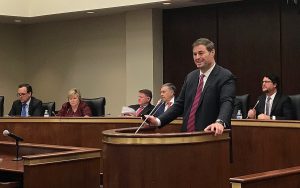
As the 2024 session of the South Carolina General Assembly ended Thursday, lawmakers of both parties were more focused on the bills that failed than those that passed.
Senate Minority Leader Brad Hutto, D-Orangeburg, called it “a session of misses.”
“We missed on medical marijuana, we missed on healthcare restructuring, we missed on energy, (and) we didn’t even get to hate crimes” he said. “These were bills that were important to quality of life and the way we treat our citizens.”
A slow suffocation

Of particular concern was the proposed Clementa C. Pinckney Hate Crimes Act, a bill named after the state senator and Emanuel A.M.E. Church pastor who was murdered along with eight of his parishioners by racist gunman Dyllan Roof in 2015. The bill would have stiffened penalties for crimes motivated by race, color, religion, sex, gender, national origin, sexual orientation, or physical or mental disability. This was the second session in a row in which the bill died without a vote in the Senate.
South Carolina is one of only two states without a hate crimes law.
“We just wasted a lot of time,” bill sponsor and Rep. Wendell Gilliard, D-Charleston, told Statehouse Report. “Now I’ll have to reintroduce the bill again next year, sad to say.”
Richland Democratic Sen. Darrell Jackson shared Gilliard’s frustration, saying that what disappointed him most was the way the bill was killed without the courtesy of an up-or-down vote.
“If the other side feels we don’t need it, let us debate that,” Jackson said. “But this was the worst way to go down – because, quite honestly, it was spineless.”
A last-minute demise
Even more dramatic than the slow suffocation of the hate crimes bill was the last-minute demise of health care restructuring legislation that was a major priority of S.C. Gov. Henry McMaster and leaders of the House and Senate. The bill would have consolidated South Carolina’s sprawling health care bureaucracy into a single streamlined entity reporting to McMaster.
The legislation died with only moments left in the session when Spartanburg Republican Rep. Josiah Magnuson raised a procedural objection that couldn’t be addressed before time ran out at the legally mandated hour of 5 p.m. Magnuson is a member of the House Freedom Caucus, a far-right faction that’s been crossing swords with G.O.P. leaders since January.
Late Thursday, Magnuson told reporters he’d killed the bill because leaders hadn’t allowed sufficient opportunities for debate and amendments.
“If the bill is good for South Carolina, which I don’t believe that it would have been,” Magnuson told reporters, “then it’s House leadership’s fault for not allowing the bill to be fixed.”

But House Speaker Murrell Smith described the move as legislative hostage-taking.
“Holding hostage bills like that only hurts South Carolinians,” Smith told reporters. “It doesn’t harm the members that they feel weren’t nice to them. It doesn’t harm the institution. It harms real South Carolinians.”
Smith then linked the Freedom Caucus’s conduct throughout the session to larger political forces that have been disruptive on the national level.
“It’s not lost on me that yesterday you see chaos created in Washington, DC, and the same agents who’ve been imported down to South Carolina try to create chaos on our floor and try to kill bills to get attention,” Smith said. “This is about governing, and I sure hope that we get back to governing and quit trying to get social media attention and clickbait.”
So what was achieved?
Despite the disappointments, GOP leaders pointed to what they saw as progress on major legislative priorities throughout the two-year session.
Abortion restrictions: Passed last year in the wake of the Supreme Court’s Dobbs decision overturning Roe v. Wade, the “Fetal Heartbeat Act” bans all abortions after the sixth week of pregnancy. A South Carolina woman is currently suing to extend the allowed time period.
Permitless carry: Dubbed “constitutional carry” by supporters, the law allows South Carolinians 18 and older without a criminal conviction to carry a handgun, openly or concealed without training or a permit. Police are barred from questioning a gun-carrying citizen without probable cause.
Gender care ban: Sent this week to the governor for signature, the “Help Not Harm Act” will outlaw medical interventions such as surgery, puberty blockers and cross-sex hormones for minors suffering from gender dysphoria. The law will also deny Medicaid benefits for such care to South Carolinians under the age of 26.
Internet pornography: Passed by the Senate on the last day of the session, the “Child Online Safety Act” requires pornographic websites to verify that users are 18 or older before displaying graphic content. Like similar bills in Louisiana and North Carolina, the law is expected to be challenged in federal court on First Amendment free speech grounds.
Judicial selection: Now headed to a conference committee to work out differences between House and Senate versions, the bill will reform a system of selecting judges that’s long been plagued by charges of corruption. Though details of the two bills vary at this point, the idea is to reduce the legislature’s now-absolute authority over appointments by giving the governor a larger voice in the process.
What’s left to do
With the legislature having now adjourned for the year “sine die” – a Latin phrase meaning “without a day” to return in regular session – members can only reconvene in 2024 in case of a fiscal emergency or to consider items that have already been passed by both chambers.
At the top of that list will be the $13 billion 2024-25 state budget, which passed the House and Senate with significant differences that will have to be hashed out in a conference committee.
Members are expected to meet in June to begin negotiations, which are expected to focus on two major items: a Senate provision to provide $175 million for a veterinary college at Clemson, and a House plan to spend $500 million on a one-time property tax rebate for South Carolina homeowners.
Until a final budget is passed, the state will operate under a continuing resolution that finances state government at current 2023-24 levels.
- Have a comment? Send to: feedback@statehousereport.com.


